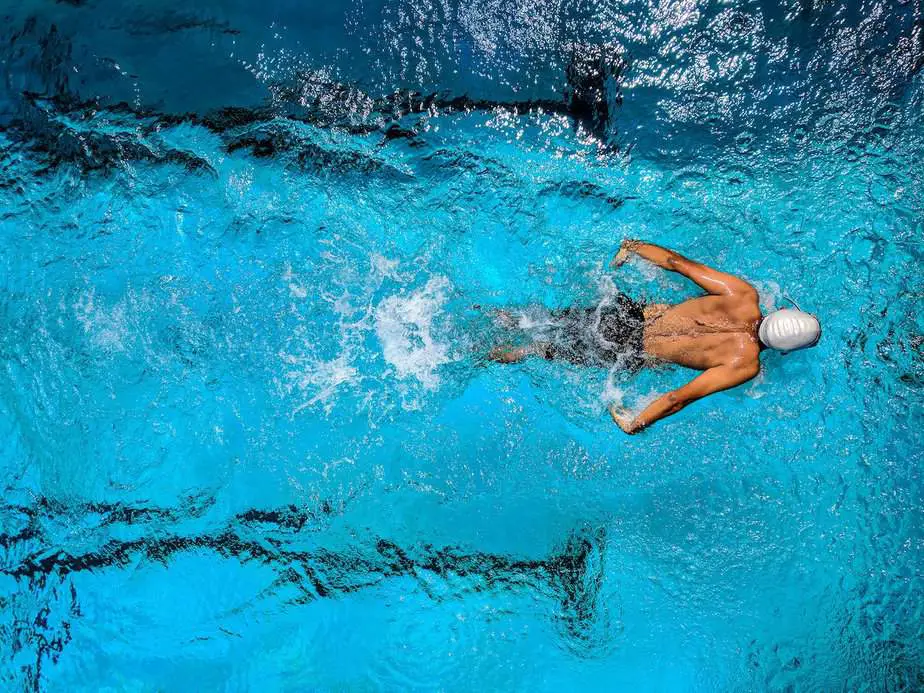It takes a long time to get good at any skill. However, what many don’t realize is how quickly one can go from absolute beginner to being functionally competent at a skill.
We cannot guarantee that everyone will learn at the same pace, but it’s not unheard of for adults to learn the basics of swimming in around two to three weeks’ time assuming a blistering pace where one takes multiple lessons a week. For children, it can take six months to a year at a pace of about one swimming lesson a week. To become a strong swimmer, it will take years of practice no matter what age you are.
Some factors that can affect how long it takes to learn swimming are fear of the water, being physically unfit, quality of swim instructor, frequency of lessons, and willingness to learn. Young children may lack maturity or stamina, and may have trouble following instructions. Adults tend not to have these issues.
In this article, we will discuss the various factors that can affect how long it takes to learn how to swim in more detail. Knowing these factors and how to overcome them may help you and/or your children learn how to swim more quickly.
Factors that affect how quickly you can learn to swim
Past experience
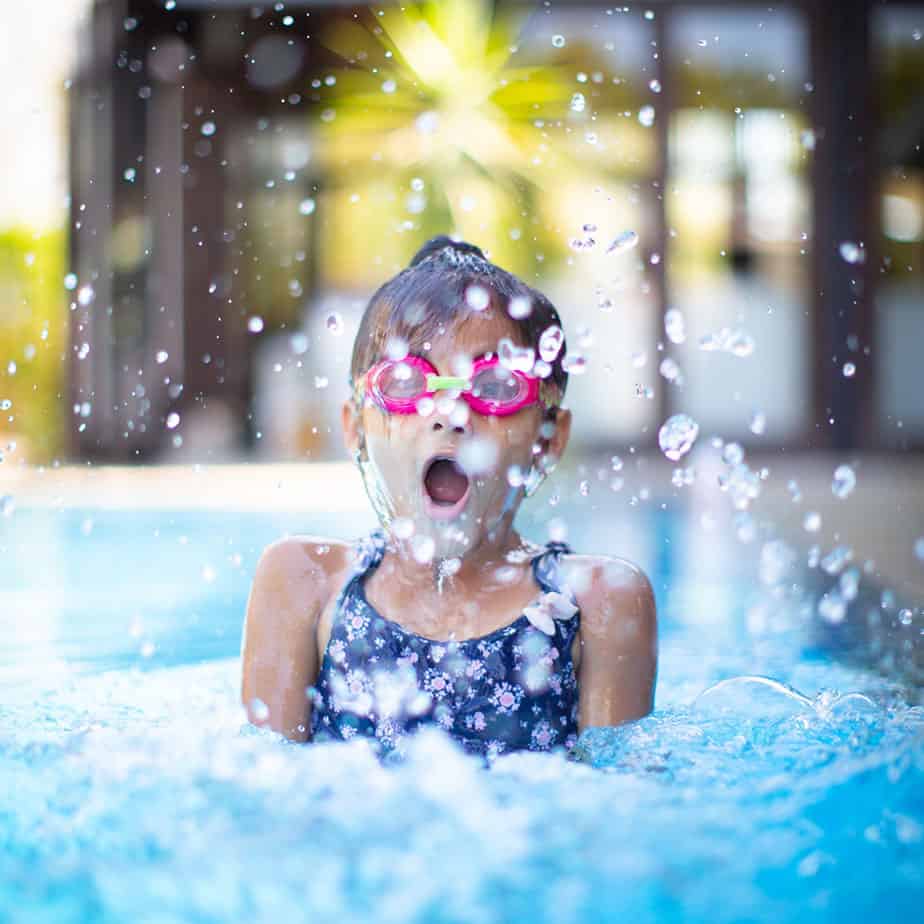
Or lack thereof. If you’re an adult and had swimming lessons in your youth, then you will make progress significantly faster. Even informal “lessons” in the water can make a huge difference because you have an initial base to work from, whereas an absolute beginner doesn’t.
It will be like riding a bike again after years of not riding one; most people seem to be able to pick up right where they left off. Having past experience also means you likely don’t have any fear of the water which can act as a psychological mind block for some beginners (more on this below).
Conversely, someone with absolutely zero experience in the water will need to spend some time getting used to moving around underwater and overcome their fear of it. They will also have to learn the absolute basics such as how to float on their back, do a backstroke, and other skills that someone with experience may already know.
No matter what your starting point is, I have never seen a child or adult who couldn’t eventually learn how to swim given enough time and effort.
Frequency of lessons
Just the same as any other repetitive physical activities, you will eventually develop muscle memory which is when your brain starts to automatically perform the movements for you without you having to consciously think about it.
An obvious example of this is breathing. You rarely consciously breathe because your body automates this process all day and it’s not mentally tiring compared to conscious breathing. You won’t have as much cognitive load or feel like your brain is tired after a swimming session once you develop this motor memory for the actions performed while swimming.
By increasing the frequency of lessons, you can more quickly create muscle memory which will help you maneuver your body through water more easily. Once you have this foundation, learning more skills becomes much easier as described above.
That said, going to the swimming pool every single day is a significant investment in time and effort. For some, it’s not practical. For others, they are at a stage in their life when they can afford to do this.
Most people are content with taking only one swimming lesson a week. Some will take swimming lessons 5 days a week. Others may take a swimming lesson every other day (2-3 times a week). Any longer than that, and it will take longer to develop the muscle memory and you may forget what you learned in the last lesson.
Consistency
Expanding more on that last point, imagine two people of equal aptitude who are both starting from scratch. The first swimmer takes one swimming lesson a week over the course of five weeks, for a total of five lessons. The second swimmer takes five lessons all in one week. Both participated in five lessons, but who do you think is the stronger swimmer?
Chances are good that the second swimmer is the better swimmer. Lessons build on each other, and taking a week-long break between lessons increases the chances of a swimmer forgetting what was taught last time. Unless that swimmer is practicing on his/her own time to reinforce the lessons, they may forget some of it and waste time each week recapping what was taught last week.
That said, there is something to be said of consistency. Even though the one-lesson-a-week swimmer does not see as many results, over a long enough period of time they will eventually learn all they need to know.
Contrast this to a third swimmer who enrolls in swimming lessons, attends sporadically, then drops out for months at a time, then enrolls in more swimming lessons. This third swimmer will not establish any foundational swimming skills, and the months off from swimming will cause him/her to forget basically everything they learned.
Consistency ensures that you will at some point learn what is being taught through repetition over a long enough time-frame, and someone who is too sporadic will struggle to retain any information.
Private or group lessons
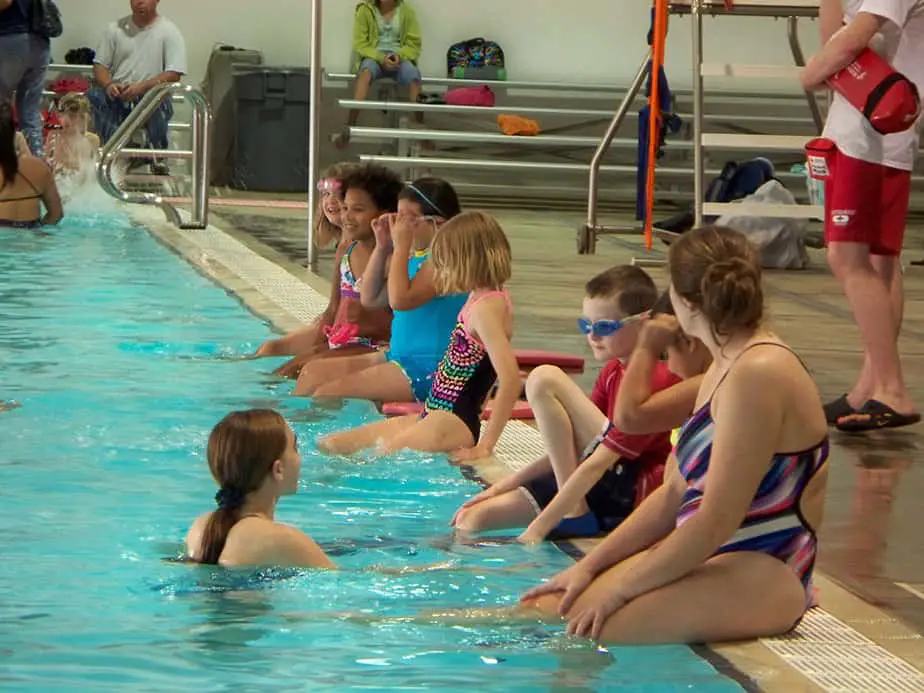
Swimming lessons are often taught in a group, but you can also take private one-on-one lessons.
Group swim lessons are more affordable and give you or your children an opportunity to interact with others and make friends. However, the swim instructor can only afford to give you their attention for a few minutes total.
In a private swimming lesson, 100% of the instructor’s attention and time is spent on you. You will receive personalized instruction the entire time, and the instructor will more quickly point out errors and help you correct them. Private lessons are more expensive and you do not get to make friends with others.
If you or your children want to learn how to swim at a leisurely pace while making friends along the way, then group lessons are the better choice.
If you have the money and want to learn how to swim as quickly and effectively as possible, then private lessons are better.
Fear of water
Typically speaking, the older someone gets without any swimming experience, the greater their fear of the water. They heard about the dangers of being in deep water, read statistics on drowning-related deaths, watched one too many horror movies with creatures of the deep, whatever; now they are irrationally afraid of water.
Some people also had the unfortunate experience of nearly drowning when they were younger, so they are dealing with lasting fear due to a traumatic event.
Whatever the case, someone who is afraid of the water will need extra time just to overcome their fear of the water. This is beyond the scope of this article, but perhaps they require exposure therapy. Let the swim instructor know about you or your child’s fear of the water so they can adjust their lessons to account for this.
Parents with young children, it is a good idea to enroll your child in swimming courses as early as 1 year old so that they never develop an irrational fear of the water.
Maturity
The American Red Cross and the American Academy of Pediatrics recommends parents to take their children to swimming lessons as early as 1 year of age, because the skills taught can help save their lives if they accidentally fall into a body of water.
The downside of this advice is that at these young ages, it can be difficult for children to understand and follow instructions. Young children do not understand how critically important swimming lessons are; they just want to play.
Most swim instructors handle this by teaching how to swim through fun activities in the water. How quickly a child learns how to swim depends on their maturity level and willingness to participate in these games.
What does knowing how to swim mean to you?
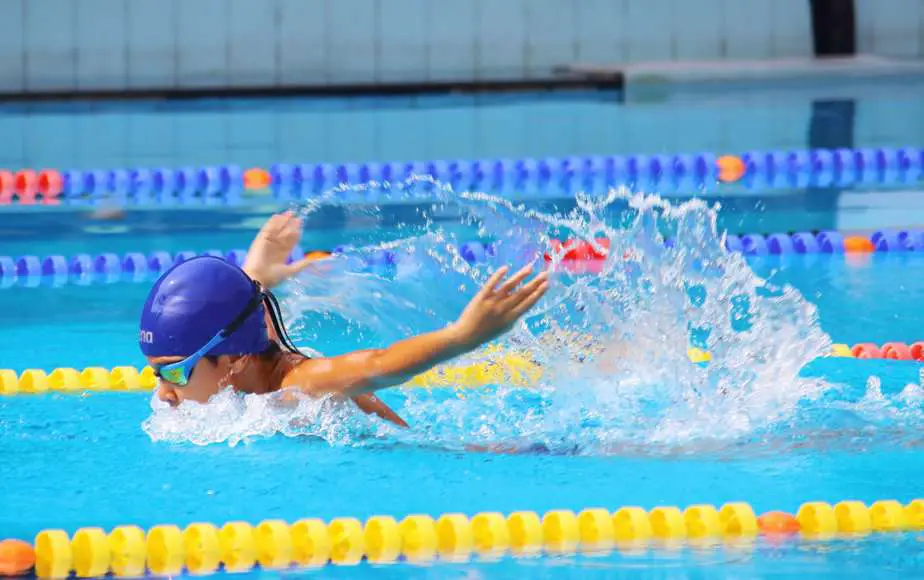
Everyone has different definitions on what it means to know how to swim. This definition can vary wildly and therefore the question of “how long does it take to learn how to swim” is difficult to answer.
The Encyclopedia Britannica defines swimming as such: “the propulsion of the body through water by combined arm and leg motions and the natural flotation of the body.” That is open to a lot of interpretation.
For some, knowing how to swim is mastering the correct form for each swimming stroke, mastering side breathing, and having the stamina to swim dozens of laps.
For others, just knowing how to travel a short distance without any assistance, being able to surface after submerging in water that’s deeper than their height, being able to float on their back to conserve energy, and not panicking if they are in deep water is enough for them to consider themselves an adequate swimmer.
These are all fine definitions but you need to understand that someone with very high standards will take a lot longer to meet those standards.
For most, being functionally competent at swimming is good enough, and reaching that only takes a few weeks to a few months of consistent, dedicated learning, depending on the factors mentioned above.
Tips on learning how to swim
Go at your own pace
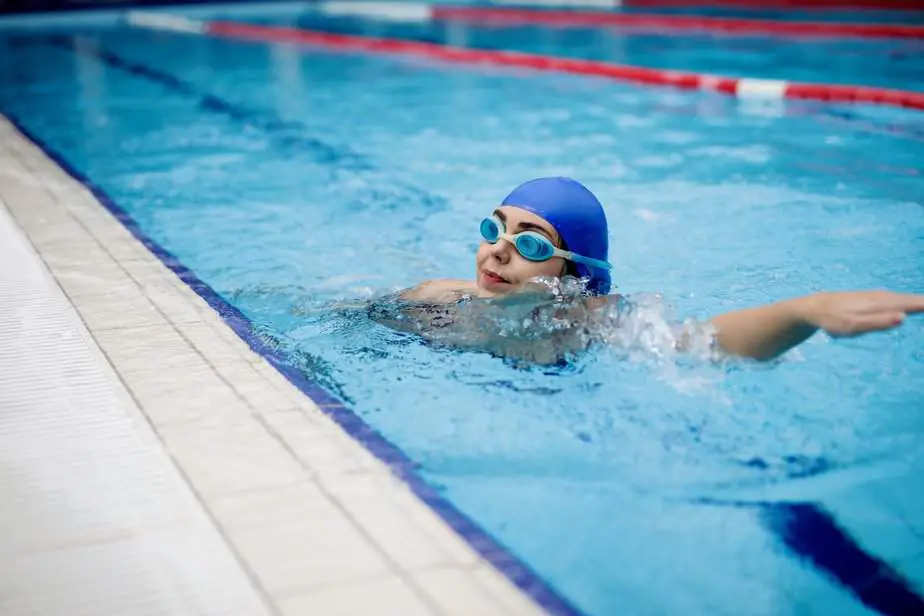
Who knows, maybe you’re a natural in the water… or you’re a total klutz. It could take only a few weeks of hard work, or it could take you years to learn how to swim. There’s nothing right or wrong with either one.
When selecting a swimming school, I recommend searching for one that prioritizes reaching goals rather than deadlines. Everybody learns at their own pace and should not be rushed.
Besides, some people start off really slowly – struggling to even put their face underwater in the first lesson – and end up freestyling to one end of the pool by their tenth session. At some point, things will just “click” into place and you will be off to the races.
And once you’ve had your first few successes, swimming starts to get really fun. You will go from dreading the next lesson to wishing it could come faster.
Temper your expectations
Not only do people learn at different speeds, but they also get stuck at different points. Someone who made incredible progress initially might suddenly slow down a lot, or vice versa. In other words, your learning pace is not linear, and this is confusing to some people.
It is important to set reasonable expectations and don’t assume that initial success is indicative of future success, or the other way around. That isn’t to say you shouldn’t celebrate your victories, but don’t start slacking off either.
Communicate with the instructor
So that you can overcome your sticking points, it is important to bring up any concerns to the instructor. As a parent, you may have to speak on behalf of your child.
Any instructor worth their salt will create a custom plan for each student because they know everyone learns at their own pace. There is no “perfect” curriculum that works for everybody.
In a group setting, an instructor’s attention is divided, so not as much attention is given to a single individual compared to a private lesson. Instructors are human and can miss things, so it is important to bring up any specific concerns you have to the instructor in case they missed something.
Choose the right instructor
Sometimes an instructor just isn’t right for you or your child. You should have some faith in the instructor, but if you find you are not receiving enough personalized feedback, or they are not taking your concerns into account, there’s nothing wrong with switching instructors.
Once again, look for an instructor that is goal-oriented over one that tries to adhere rigidly to a fixed schedule. An instructor must adapt to his students, not the other way around.
Can you learn how to swim in a week?
Once again, this goes back to your definition of knowing how to swim. Some people’s standards are lower, and perhaps it is possible for them to learn how to swim in a week.
Think of it like this. Can you go from a sedentary lifestyle to running a 5k in a week? Some people are naturally gifted enough to do this; they may do it inefficiently, but they can still get it done, and the same is true of swimming.
There is a knowledge component and a physical component to any sport. You can cram all the knowledge you can into your brain, but actually performing the movements is another issue.
Someone who is gifted athletically might be able to accomplish this just through sheer brute force. That said, it’s important to be knowledgeable on the proper form so that you can conserve energy.
I think in one week, you can learn the basics like how to float on your back and how to do the backstroke and front crawl. However, if you want to learn more swimming strokes, be capable of swimming large distances, or handle rough waters, then I don’t think it’s practical to set a deadline of a week.
For the best chances of accomplishing this, you need to hire a private swim instructor and you need to practice literally everyday.
Can you learn how to swim in a day?
This is even more extreme than the previous scenario, and I already think you can’t really learn how to swim in a week unless you have past experience. Then this is even more true of learning how to swim in a day.
At best, you can perhaps hope to learn how to submerge your face underwater and float on your back or do the doggie paddle. But I’d hardly call that swimming, more like surviving, and probably not for very long either.
Unless you were an active swimmer before and you plan on re-learning what you knew before, then I don’t think you can learn to swim in a day.

